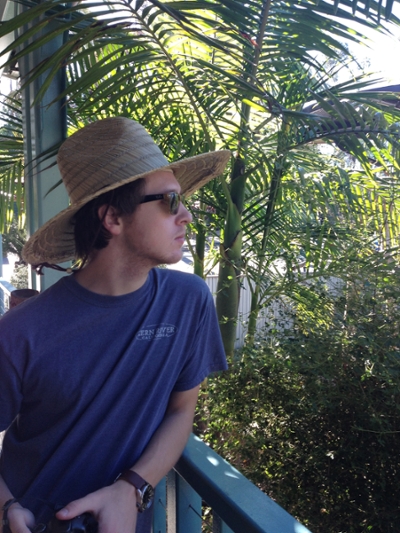 myCSUSM
myCSUSMevansmithinterview_feb15

Interview:
AA: Some GEW instructors use a theme to guide the content and discussion of composition. You don’t use a theme, so what is your approach to teaching GEW, and/or why don’t you use a theme?
ES: After I make sure all the bureaucratic boxes are checked—the text I am supposed to teach, the word requirements I have to meet—I try to design assignments that build on one another, that lead into one another, that reflect typical college writing. My goal throughout the semester is to cultivate in the students the agency to change their writing, given different rhetorical situations and personal intentions or motives. I find that themes can sometimes alienate students and distract others from learning about composition, and aside from these detriments to their education, I avoid using a theme because I want to evaluate their writing as objectively as possible. Writing can be a political act, but introducing a theme too often interjects commentary about controversy where commentary about writing is more appropriate.
AA: At the end of each semester, you ask each student in your class to generate a question that would be helpful for a future student to know the answer to. And then you have that same student write the response (so write the question and then answer it). Can you share one of your favorites?
ES: One student asked the question, “What words are pet-peeves of Professor Smith?” The response to that question included the following answers: “that,” “obviously,” “thing,” and sentences beginning with “this is,” “there are.” This one is a favorite because she not only knew the answer, but also continued to explain my intention. These words aren’t evil. They aren’t “bad” writing. But they are common bad habits that go unnoticed. They contribute to wordiness, disinterested writing, overly simplistic claims, and, often, a reader’s utter boredom. After students learn to get rid of every instance of these words, they have better authority to use these words deliberately.
AA: What is your favorite assignment to give to GEW students?
ES: My favorite assignment in a classroom is having students research the writing they will come to know and practice in their field and career. This assignment not only introduces them to their career in a context that they might not have considered, but it is also the culminating demonstration of their research abilities, their analysis, and their ability to prioritize the content of an essay that they have free range in.
AA: What do you find to be most fulfilling about your role as an instructor of composition?
ES: Somebody pays me to tell people what to do [laughs]. No. What’s fulfilling? A series of moments where I see genuine realization in the student’s face of what I’ve been telling him/her all semester. But in this moment, I have articulated it just right, and the student is, at that moment, mentally prepared to learn it. And when I can’t see the student’s face, it is the moments when I see the realization appear in the student’s paper.
AA: You went to CSUSM as an undergrad and for your Master of Arts degree. How does this impact your teaching pedagogy?
ES: I am a Cal State alumni twice over, I lived in the dorms my freshmen year, I was a Writing Center consultant for five years, and I enjoyed the campus life that my students are currently participating in. All of this plays into my pedagogy because I can identify with the different situations that my students are in when they are outside of the classroom—situations that might be affecting their participation and completion of assignments. It gives me a better understanding of what motivates them in my class.
AA: In addition to the courses you teach at CSUSM, you also teach composition courses at Palomar College and MiraCosta College. How does this range of teaching intersect or influence how you design your courses at CSUSM?
ES: Teaching at other campuses gives me a wider range of students with different backgrounds. It also allows me to experiment with other assignments before integrating them into other courses. It also guarantees that I live, breath, and sleep my work.
AA: What do you do for fun outside of teaching?
ES: I am passionate about property rights [laughs]. I spend time with my family and girlfriend. I am a passionate movie watcher. Westerns, horror, rom-coms: I love them all. And I am up-to-date daily on the trailers for new movies, be it blockbusters or B movies.
AA: What is your favorite quote from a film or from a written text?
ES: I don’t play favorites, so I’ll give you two good ones:
“Everywhere and at all times it is in thy power piously to acquiesce in thy present condition, and to behave justly to those who are about thee, and to exert thy skill upon thy present thoughts, that nothing shall steal into them without being well examined.”
--Marcus Aurelius, The Meditations, translated by George Long
“I may not be a smart man, but I know what love is!”
--Forest Gump, Forest Gump
AA: Any words of encouragement to offer students this semester?
ES: “Just write the dang paper.” Too often life gets in the way, or we find ourselves in a rut. When you think of quitting or can’t stop worrying, breathe a deep breath and take a moment to contemplate: What I have overcome in the past is such a small matter now; let this become yet another small matter, and let me conquer it as though it were.






